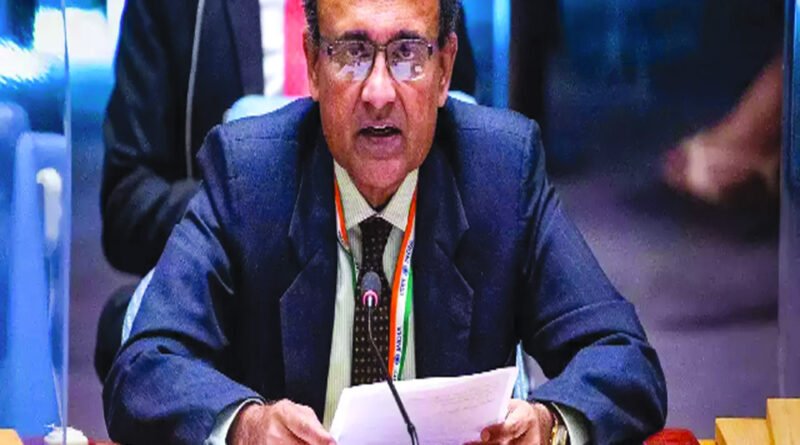Combating religious phobias
The United Nations as well as world at large needs to have better understanding of religious phobias which have many shades.
India has again cautioned the world about the dangers inherent in religious phobias. Raising the issue of Hindu phobia as also anti-Sikh and anti-Buddhist phobias, it once more called upon the United Nations to take appropriate steps to ensure logical balance while considering or discussing such phobias prevalent in the world. There cannot be double standards on religious phobias and combating these should not be a selective exercise.
Early this year UN General Assembly adopted a Pakistan-introduced resolution to proclaim 15th March as International Day to combat Islamophobia. Speaking at a high-level event on the eighteenth of June to mark the celebration of the first anniversary of International Day on Combating Hate Speech, India`s permanent representative to the UN T.S.Tirumurti said that the selective approach to dealing with religiophobias could well set a precedent that will lead to multiple resolutions on phobias based on selective religions which could turn the world body into religion camps.
The selective approach is completely unrelated to realities on the ground, lopsided and illogical.
Earlier in a major such incident in March 2020 a bomb attack by fundamentalists on a Gurudwara in Kabul killed twenty-five Sikh worshipers. During the last several decades such attacks and atrocities on Hindus and Sikhs in Afghanistan have almost completely diminished their population in Afghanistan which stood well over seven lacs before the occupation of the country by erstwhile Soviet forces in 1979.
In 2001 when the Taliban were at the zenith of their power in Afghanistan, explosives were laid at the base and the shoulders of the two Buddhas at Bamiyan blowing those to pieces. The whole world was outraged and aghast. Was the outrage a reaction to Islamophobia or fulfilment of an edict to pull down the gods of infidels and ultimately dominate the world? It is such faulty approaches of the world body unrelated to the reality that depicts its colossal inadequacy and adds credence to calls for its urgent restructuring to make it fully representative and subsequent reformation.
The worst is that in Pakistan even attacks on holy places of minorities have turned into recurring occurrences. On December 31, 2020, a Hindu temple including the Samadhi of a Hindu religious leader in its premises in Karak District of Khyber Pakhtunkhwa province of Pakistan was set on fire by a mob led by some clerics and supporters of radical Islamist Jamiat-e-Islam party Fazalur Rehman group in Pakistan.
Such heinous crimes bring into focus almost perpetually continuing decades-old discrimination and persecution on religious grounds against minorities in Pakistan and draw attention to Nehru-Liaquat Pact arrived at between the then Prime Minister of India JawaharLal Nehru and the then Prime Minister of Pakistan Liaquat Ali Khan at New Delhi in April 1950.
The fact is that after the partition of India in 1947, the population of Hindu, Sikh, Buddhist, Jain, and Christian minorities who lived in Pakistan has dwindled drastically whereas the population of Muslims who lived in areas which later became Indian Union has grown fabulously. While in India rights and security of minorities have been continuously and effectively safeguarded, Pakistan has persistently contravened the provisions of the Pact through consistent neglect and persecution of minorities.
India has also told the world body that it is equally concerned about attempts to characterize the motivation behind terror groups which could push the world back to pre-eleventh September 2001 era when there was hardly any compunction even in using terrorist groups to aid the state policy. Referring to the latest UN strategy to fight terror, India has also cautioned the Security Council to guard against new terminologies and false priorities which could dilute the fight against terrorism. Any dilution of terrorism could well turn it into a recognized means to achieve an undesirable end.
India has been the worst victim of terrorism particularly cross-border terrorism even though it has been the strongest bulwark against intolerance and hatred. Its multicultural edifice has always made it a haven for all those who sought refuge in India at one time or the other irrespective of whether they were Jews, Zoroastrians, Tibetans, or those from India`s neighborhood. India has been following the principles of democracy with its necessary checks and balances and whenever or wherever any aberration occurs, it is addressed within the confines of the law and the country does not need selective outrages from outsiders. Indis strongly believes that a society based on pluralism where every religion is respected is the sine qua non for tolerance and harmony.
Terrorism hampers the evolution of global human civilization and globalized order. India has consistently pleaded including at UN platforms for concerted efforts by the international community to combat hate, violence, fundamentalism, extremism, and terror not just only against Abrahamic religions, but equally against followers of all other religions. .
(The writer is a former IIS officer and freelance journalist. Views expressed are personal.)
Source: The Pioneer




